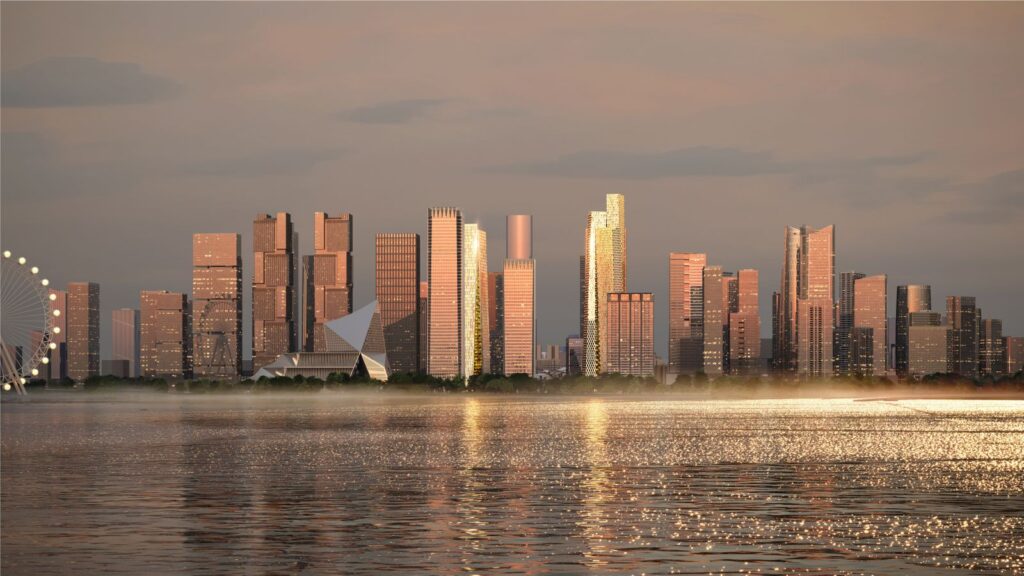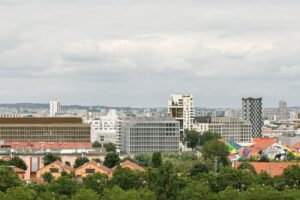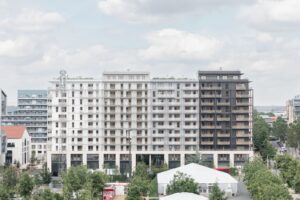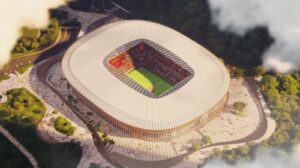Qianhai Prisma Towers by BIG-Bjarke Ingels Group

Situated in the Guiwan District within the metropolitan city of Qianhai, the BIG-designed Qianhai Prisma Towers will flank each side of the Shenzhen Hong Kong Plaza – also known as the ‘green belt’ – marking the entrance to the neighborhood. New workspaces, residences, and 20,000+ m2 of multi-level public spaces will be positioned steps from an integrated regional transport hub and the Qianhai Bay.
Both towers are defined by gently leaning volumes that taper towards the sky – a subtle gesture that adds structural efficiency while creating verdant openings between the volumes and a generous ground-floor public realm. The lush biophilia on the balconies and ledges contrasts the glass facades that shimmer subtly throughout the passing of the day.
Image © BIG-Bjarke Ingels Group
“Both towers are conceived as simple prismatic building envelopes split open to make room for public space on the ground where they stand. The open seams and gaping corners allow the green spaces to ascend from the ground to the sky leaving wedges for outdoor gardens and terraces for the life of the people living and working within.” Bjarke Ingels, Founder & Creative Director, BIG.
The ground plane of the towers opens up to create a dynamic and welcoming urban living room while connecting the towers to the ‘green belt’ and nearby shopping mall. A meandering biophilic pedestrian skybridge functions as a canopy, providing shade and protection from the rain while connecting the shopping mall, the retail podium, and the surrounding neighborhood.
Image © BIG-Bjarke Ingels Group
Peeking through the building envelope openings, cascading green terraces are introduced from the street level and up to the roof, where office workers and visitors can enjoy 360-degree views of Qianhai Bay. PV cells are integrated in the slightly tilted office tower’s West and East façade spandrel to maximize the PV efficiency.
To better respond to the local climate achieving and improving thermal performance, double-skin closed-cavity façade (CCF) is used for the most exposed orientation of office tower. The apartment tower units have operable ventilation inlets built into the window frames to allow for natural ventilation.
Image © BIG-Bjarke Ingels Group
The tripod footprint of the 130,760 m2 residential tower is a radial array of three rectangular volumes that step up at different heights – providing multiple views towards the city and the ocean while creating beautiful living spaces, ‘sky garden’ terraces, and a roofscape. Between the volumes, the envelope opens up to create a subtle crevice of green balconies, from the ground level to the roofs.
From the interior of the tower, the corners peel open to create outdoor terraces on every floor. The west tower wall extends slightly skywards to reiterate the leaning gesture – delicately joining the remaining three walls/envelopes to create a sculptural addition to the skyline.
“As the tower footprints open to the ground, they celebrate the connectivity to the transit infrastructure, retail and adjacent buildings.
Image © BIG-Bjarke Ingels Group
Image © BIG-Bjarke Ingels Group
Pedestrian walkways connect multiple stories to provide seamless transitions between the towers and the surrounding public programs, forming a pedestrian network that leads up to the Qianhai Bay Waterfront Park.” says Martin Voelkle, Partner in Charge, BIG.
The ground floor wayfinding takes inspiration from the Qianhai Bay, oftentimes appearing as a series of ripples while facilitating the flow of people through the entrances in and around the towers.
The public realm of the ground floor office tower includes an amphitheater, tree-shaded social spaces, and an under-porch bar. In response to the climatic characteristics of the region activities are located under the canopy, trees and overhangs of the building. Rainwater is collected via the sloped curtain walls, utilized for irrigation system and maintenance of the public space.
Image © BIG-Bjarke Ingels Group
Both towers are strategically positioned between the two intercity railways; the Guangzhou-Shenzhen Intercity Railway is at the east side of the site, and the proposed Hong Kong-Shenzhen Western Express Railway will be at the west side of the residential tower. An adjacent below-grade retail corridor will provide both towers with direct access to the Transportation Hub via the below-grade lobbies.
To complement the accessibility of the transport hub, an additional 966 long-term bicycle parking spaces will be available for building occupants. The Qianhai Prisma Towers, expected to begin construction in 2025, will be BIG’s second project in Shenzhen following Shenzhen Energy Mansion’s completion in 2017. Source by BIG-Bjarke Ingels Group.
Image © BIG-Bjarke Ingels Group
Location: Qianhai, Shenzhen, China
Architect: BIG-Bjarke Ingels Group
Partners-in-Charge: Bjarke Ingels, Martin Voelkle, Douglass Alligood
Project Manager: Flora Bao
Project Architect: David Holbrook
Design Lead: Ricardo Palma
Design Team: Amie Yao, Bianca Blanari, Chris Tron, Eric Li, Florencia Kratsman, Jacob Li, Margaret Tyrpa, Mama Wu, Ryan Duval, Shu Du, Sungmin Kim, Yanan Ding, Yao Tong, Yimin Wu, Zhonghan Huang
Collaborators: CADG (Local architect), BPI (Lighting), ARUP (Fire Safety), Buro Happold (Traffic, Sustainability, VT), RFR (Façade, BMU), Thornton Tomasetti (Structure), Turenscape (Landscape), CADG (Architecture, MEP), Atchain (Visuals), RJ Model (Physical Model)
Client: Shenzhen Metro
Size: Residential Tower: 130,760 m2; Office Tower: 110,697 m2
Year: 2023
Images: Courtesy of BIG-Bjarke Ingels Group





